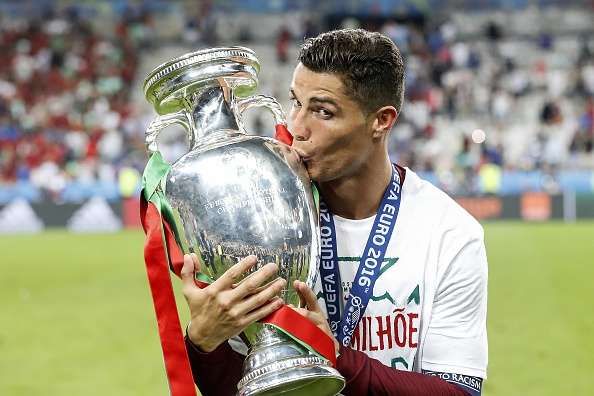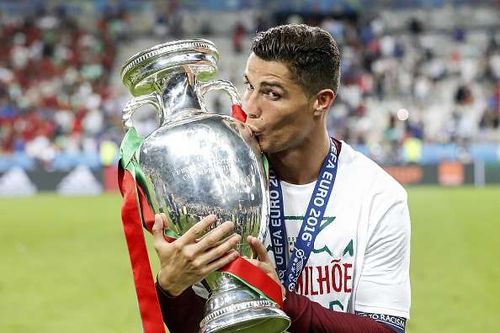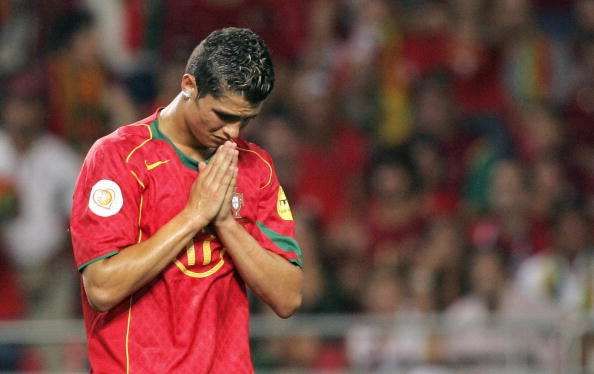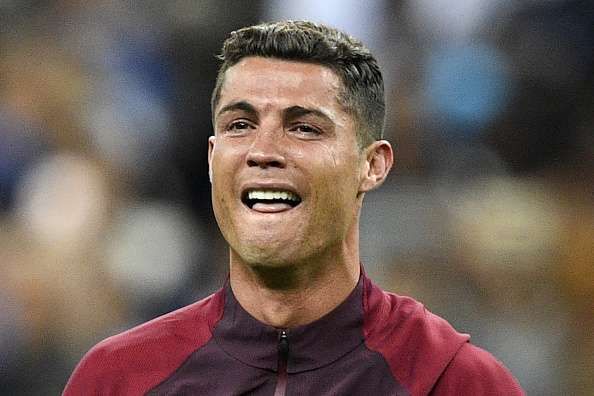
Euro 2016: Cristiano Ronaldo completes Tour of Euro emotions
The sight of a garnet red jersey soaked in Cristiano Ronaldo’s tears was once indelibly linked with Portuguese footballing despair.
It was the final of Euro 2004, and Portugal went into the occasion brimming with confidence. Five of their 11 starters had been crowned champions of Europe already – at club level with FC Porto, under the stewardship of a certain Jose Mourinho. They boasted an embarrassment of world-class talent in Luis Figo, Deco, Ricardo Carvalho and others.
Their opponent was Greece, the team that surprisingly defeated the Selecao in the opening game of the tournament. The Greeks were no longer an unknown quantity come the final, however, and the gulf in class between the two sides was immense.
The venue was Lisbon’s newly rebuilt Estadio da Luz (Stadium of Light), a reincarnation of Portugal’s preeminent footballing cathedral. The man who shone brighter than anyone else at the old Stadium of Light, Benfica and Portugal legend Eusebio, since passed on to the ranks of football’s true immortals, was on hand to give out the medals.
The setting, the law of averages and all footballing reason pointed to a Portuguese victory.
A prodigy’s heartbreak
If Eusebio was the venerable godfather of Portuguese football, Cristiano Ronaldo was its carefree child.
The 19-year-old had started the tournament as an impact substitute but went on to cement a place in Luiz Felipe Scolari’s starting XI by the time the knockout stages rolled around. His performances, all flair and fleet-footedness, screamed youthful exuberance.
But Otto Rehhagel’s well-drilled Greek troops were having none of it. Sucking up space and weeding out any saplings of creativity, they ensured that the pitch assumed the feel of a battleground rather than a playground. Angelos Charisteas scored from a header, Portugal lost and Ronaldo wept like a child.
Once the tears had subsided, there was time for this prescient thought from the teenager – “There will be many other opportunities to win in Europe throughout my career, and make up for this huge disappointment."
Unlikely resurrection
If Euro 2004 was preceded with Portuguese excitement at a golden generation poised to fulfil its destiny, the most anyone realistically hoped for from Euro 2016 was perhaps a dignified exit at the quarter-final stage.
After all, the current Selecao crop is a far cry from the 2004 vintage. Ronaldo, Pepe and penalty kick-shy Joao Moutinho aside, the squad was reasonably perceived as a collection of timeworn (Ricardo Carvalho), erratic (Nani) and unproven (Renato Sanches) figures. Accordingly, Portugal came into the competition not expected to do anything special.
Some would say they lived up to that billing. The tournament’s newly expanded format allowed Fernando Santos’ men to squeak into the knockout stages despite failing to register a group stage win. Extra-time and penalty shootout victories saw them stumble into the semi-finals without ever really convincing.
There was nothing unconvincing about Cristiano Ronaldo’s majestic header however, the captain emphatically opening the scoring to lead Portugal to a 2-0 victory over Wales, becoming the joint-most prolific goal-scorer in the history of the European Championships in the process.
12 years ago too, it was a Ronaldo header that sent Portugal on their way in the semi-final.
After the game, the Real Madrid superstar was asked to reflect on the tearful, miserable scenes of 2004. His response was beautifully, almost cringe-worthily clichéd – “I hope that on Sunday you’ll see me crying tears of joy”.
Metamorphosis
There is little childlike abandon remaining in contemporary Cristiano Ronaldo.
The sparkling, unpredictable whiz-kid has long been replaced by a ruthless goal-scoring machine, the lithe frame supplanted by near-comic book muscularity, and the mischievous grin displaced by stone-faced sternness.
This is a Ronaldo who has lost a step, and has packed on the brawn as a means of adapting his play to his physical mortality. The fear factor he holds now revolves around his lethality in and around the penalty box. The ability to take on and skin backtracking defenders has faded, living on only in the memory and on YouTube.
Even the free-kicks no longer carry the sense of anticipation and dread that they once did.
Also read: An open letter to Cristiano Ronaldo after winning his first international tournament
Where the Ronaldo of some years ago would stamp his authority on the very texture of a game, plying and bending it to his will like a child messing around with LEGO blocks, today’s Ronaldo is a player of moments – a towering header here, an audacious back-heel flick there. Injuries and Father Time have colluded to erode away at the capacity to dominate games over 90 minutes; Cristiano Ronaldo ver. 2016 instead leaves his mark through singular, staccato moments.
He was cruelly denied a chance to produce any signature moments in the final however, a crunching Dmitri Payet tackle ending the Portugal captain’s participation and marking out the rotund Frenchman as an early if dubious Man of the Match candidate.
Catharsis
The rest, of course, is history. Robbed of the chance to contribute on the field, Ronaldo instead took up the mantle of dressing room leader, delivering a rousing half-time speech before brainwashing a Guinea-Bissau-born, foster home-raised Swansea City reject into believing he could score the most important goal in Portugal’s history.
The talisman spent the duration of extra-time kicking every ball and lunging into every tackle with his teammates out on the pitch, even as he limped on the sidelines, knee strapped. You could take Ronaldo out of the team, but you couldn’t take the team out of Ronaldo.
When it all ended, his reaction was one of elation and disbelief, rapture and redemption, and a cocktail of other emotions that probably weren’t designed to simultaneously co-exist.
What this title means for Ronaldo’s legacy will be debated long after his career is done and dusted. Lionel Messi’s case for being the best player of his generation remains strong; the eternal Eusebio, surely grinning from ear-to-ear up above, he whose portrait was displayed in Portugal’s team airplane upon their triumphant return home, will forever remain unsurpassed in the pecking order of Portuguese football in the eyes of some.
But when it comes to living and wholesomely embracing the full gamut of emotions at the European Championships, Cristiano Ronaldo stands out on his own.


